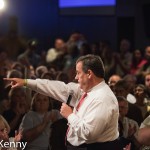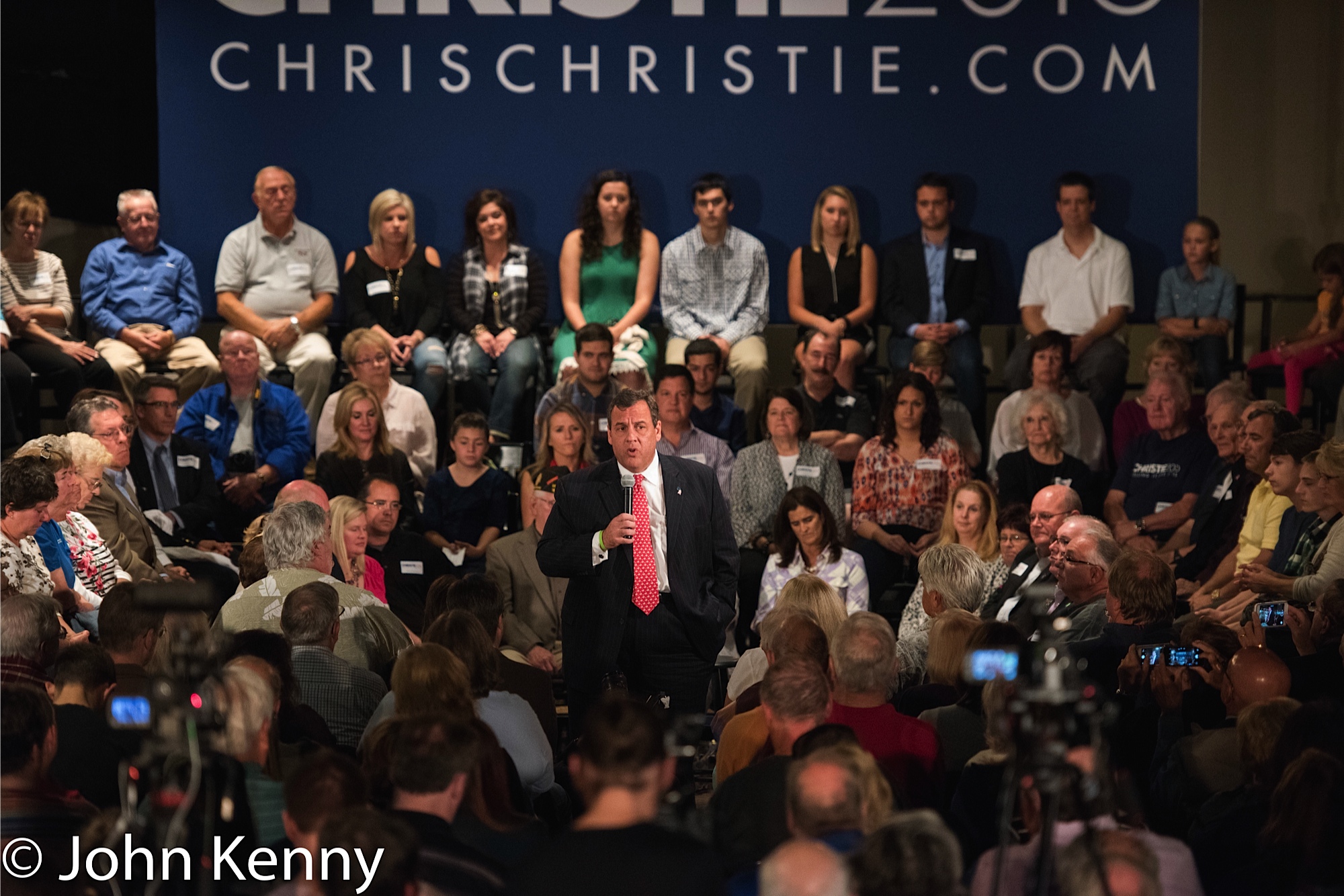It was a study in Republican contrasts.
Spending Friday attending separate New Hampshire town halls with Rand Paul and Chris Christie highlighted two of the most contrasting Republican presidential candidates. Although they share weak poll results, generally at the tail end of the top ten candidates, they differ markedly in style and substance.
 On a personal level Paul is physically compact, appearing trim and fit, seemingly reserved and not very interested in talking about himself. Christie is none of those. Although they’ve held elective office for almost the same length of time (Paul was elected in 2010, Christie in 2009), Paul is a legislator and Christie an executive, each with disdain for the other’s current branch of government.
On a personal level Paul is physically compact, appearing trim and fit, seemingly reserved and not very interested in talking about himself. Christie is none of those. Although they’ve held elective office for almost the same length of time (Paul was elected in 2010, Christie in 2009), Paul is a legislator and Christie an executive, each with disdain for the other’s current branch of government.
The appearances I attended were also a study in contrasts, with Paul speaking for just over 30 minutes to about 50 people (in the 3rd of his 5 New Hampshire appearances that day) and Christie for an hour and 45 minutes to about 250 people. Paul was on a tight schedule, with his next event more than an hour’s drive away. Christie’s town hall was his sole New Hampshire appearance of the day and, based on conversations with audience members, his campaign staff had worked hard to produce a large crowd. Christie lingered with a large group who came up to greet him afterwards. (Notably Paul held a press Q&A, but Christie did not. His only press interaction was my brief question to him as he exited.)
Paul’s audience was attentive, with some supportive questions and post-appearance comments, but it was like Paul himself. Somewhat reserved, Paul spoke about his ideas and complaints about government with limited focus on himself. He began with a funny anecdote that concluded with a man telling Paul that his granddad “lived to be 105 by minding his own business.” It neatly sums up Paul’s outlook; the government should “mind its own business” and do less and be smaller. He spoke extensively about reducing government spending, advocating for a balanced budget amendment and characterizing the federal budget as “out of control.” Paul castigated Congressional Republicans for failing to reduce federal spending, terming House Speaker John Boehner’s resignation as “a step in the right direction.”
Paul’s other focus was on the Bill of Rights, telling his audience that Republican victory in 2016 is possible if it’s “the party of the entire Bill of Rights.” He accurately described Republicans as “the party of the 2nd Amendment”, but pushed the notion that Republicans should “believe in the 4th Amendment” and its right to privacy and “to be left alone”. He also voiced support for the 5th and 6th Amendments and their respective protections of property rights and the right to a jury trial. Paul is unambiguously against much of the government’s electronic surveillance, viewing it as contrary to the 4th Amendment and the proper role of government. It’s a view not shared by Christie or much of the Republican Party.
Christie takes an opposite view, generally supporting federal electronic surveillance and touting his own work as United States Attorney. In discussing his earlier proposal to track lawful foreign visitors to the United States in order to prevent them from illegally overstaying on tourist or other temporary visas, he advocated using a national database of thumbprints to detect such overstayers. It’s a Paulian nightmare, as it would require that large numbers of people are regularly subject to fingerprint checks by the federal government.
Governor Christie also spoke of his ideas and complaints about government, but the essence of his pitch is about himself: He’s prepared to be president and he’s here to both explain and prove that assertion. Surrounded by his audience, Christie appeared to relish the audience interactions but spent lots of time talking about himself, his parents, his wife and family. He answered 20 questions over an hour and 15 minute Q&A, proudly proclaiming at the start that he doesn’t limit or screen questions. His closing pitch was not on any policy issue, but instead about his character and his self-described transparency.
Although they’re close to each other in public polls Christie’s candidacy appears to have greater upside potential. He’s a skilled, practiced performer who’s adept with an audience. He’s impressive, even convincing, on a first impression, seeming like the proverbial “fighter”. Christie comes with lots of political baggage, however, including the still-developing tangle of problems at the Port Authority and weaknesses in his arguments of fiscal prudence. Those problems may ultimately squelch his candidacy but he can nonetheless gain traction for a time as the field narrows and primary voters give an initial listen to his pitch.
Paul represents a small slice of the Republican Party and he’s unlikely to move to the front of the pack. Although the candidates, and Party, generally express support for libertarian ideas of smaller and less powerful government few of them are truly prepared to embrace and advance those ideas as expressed by Paul.
Photo Galleries:
Our Chris Christie town hall photo gallery is here.
Our Rand Paul town hall photo gallery is here.


